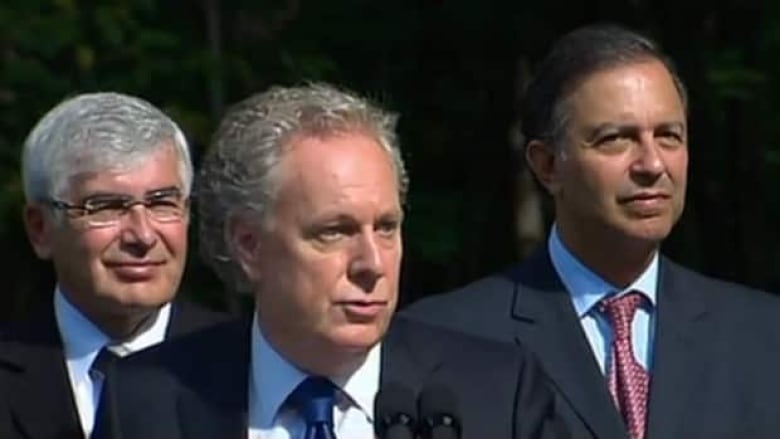Charest fights to hold off CAQ in Quebec City
Marois asks for majority to solve student crisis and kill Bill 78


Jean Charest was campaigning in Quebec City on Monday in what may be a sign that he's on the defensive and trying to shore up support in ridings the Liberals are striving to hold onto.
The Liberal leader took direct aim at the Coalition Avenir Québec, which the most recent election poll suggests could make inroads into the provincial capital region.
As part of its platform of cleaning up and streamlining government, the CAQ has pledged to take on labour unions in the construction industry, the public service and Hydro-Québec, where party leader François Legault says he wants to cut $600 million in expenses.
Charest said Monday that would mire the government in disputes.
"In Quebec, we don't want to bicker. We've got other things to do," he said. "We have a global economy that's in grave difficulty, and I'm gonna go bicker with union bosses? I'm going to take all my time as premier to go bicker with union leaders? I've got other things to do."
Charest's Liberals hold eight of the provincial capital region's 12 seats. But a poll published Monday morning by Segma Research for Quebec City newspaper Le Soleil suggests the party could lose some of those to the CAQ.
The telephone poll of 1,007 residents in the dozen ridings put Legault's team in the lead with 34 per cent support to 29 per cent for Charest's Liberals and 24 per cent for Pauline Marois's Parti Québécois. It is considered accurate within 3.1 percentage points, 19 times out of 20.
The CAQ's predecessor, the Action Démocratique du Québec, scored major gains in the Quebec City area in the 2007 provincial election but lost most of its seats there in the following year's campaign.
Charest also campaigned over the weekend in the Gatineau area around Ottawa, traditionally Liberal territory that the CAQ has its sights on.
Legault appeals to female voters
Legault trotted out 12 of his party's female candidates on Monday for a news conference in Verchères, northeast of Montreal.
The CAQ has been accused of not having enough high-profile women in its team. The star candidates whom the party has spotlighted on the campaign trail include Jacques Duchesneau, its point person on corruption, physician Gaétan Barrette, the CAQ's lead on health issues, and MNAs such as former ADQ leader Gérard Deltell.

Trying to reverse that impression, Legault stood with his candidates under a statue of Madeleine de Verchères, the heroine of a late 17th century battle between members of the Iroquois Confederacy and troops from New France.
"Women have in their heart the future of our children, of our patients, of the whole Quebec population. It's important that we present this image," Legault said.
Former TVA on-air host Jocelyne Cazin introduced the candidates, saying: "The CAQ's agenda has arrived at a crucial moment in Quebec history. It shakes up the old ways of thinking, it breaks old habits."
Cazin had been touted as a possible candidate for the party but ultimately decided not to run.
Marois seeks majority
The PQ's Marois, meanwhile, hammered home her appeal for a majority government, saying it's the best way to bring an end to the still-simmering Quebec student crisis and to fight for sovereignty.
Campaigning in the riding of Richelieu, a loyally PQ seat northeast of Montreal, Marois reached out to students in particular, reminding them of her party's promise to revoke both the contentious Bill 78 anti-protest legislation as well as the government's planned 82 per cent tuition hike.
"To do all of that, it's necessary to have — and I need — a majority in the national assembly," she said. "I can guarantee you that their fight will not have been in vain," she added, referring to students who have spent nearly six months on strike in their struggle against the tuition hikes.
A series of recent polls suggest the PQ would eke out a victory in next Tuesday's election, but not necessarily by enough of a margin to seal a majority. The results all suggest it's still a three-way race between the PQ, CAQ and Liberals.